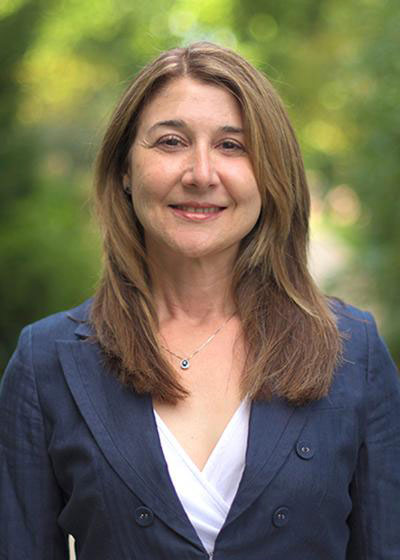Materials Science and Engineering Department head at Penn State University to deliver McMahon Lecture

Susan Sinnott, professor and head of the Department of Materials Science and Engineering at The Pennsylvania State University, will deliver the John F. McMahon Memorial Lecture at 11:20 a.m. Thursday, Nov. 2, in Holmes Auditorium, Harder Hall, on the Alfred University campus.
Sinnott, who also holds a faculty appointment in the Department of Chemistry at Penn State, will be speaking on “Atomistic Simulations to Advance Surface Science.”
According to the abstract of the lecture, computational methods are useful tools in the investigation of atomic and molecular dynamics and associated mechanisms at surfaces and interfaces. Physics-based classical potentials are a class of computational method that is useful for use in classical atomistic simulations of systems made up of thousands to many billions of atoms. These potentials consist of parameterized functions that capture aspects of atomic and molecular interactions within these material systems.
The focus of Sinnott’s presentation, according to the abstract, is on the third-generation charge-optimized many body (COMB3) potential. COMB3 was developed to enable an atomic-scale description of systems that include combinations of metallic, ionic, and covalent bonding under the same framework. The framework enables the system to determine the charge state of an atom or ion and manifest the physically appropriate type(s) and strength of local bonding as a function of environment correctly and autonomously. The framework further includes a combination of atomic-specific, bond-specific, bond angle-specific parameters; the former is the same regardless of material, and only new bond-specific and bond-angle-specific parameters are required to extend existing elements to new compounds.
This presentation will provide an overview of the COMB3 potential and illustrate its utility in the study of water-metal surface and nanoparticle interactions, the examination of carbon nanoparticle-metal surface interactions, and the mechanisms associated with the growth of metal films on metallic and oxide substrates.
Sinnott earned a B.S. in chemistry from the University of Texas at Austin and a Ph.D. in Physical Chemistry from Iowa State University. She went on to be a National Research Council Postdoctoral Associate at the Naval Research Laboratory.
She began her career in academia in 1995 as an assistant professor of materials science and engineering at the University of Kentucky (UK). During this time, she received the Oak Ridge Associated Universities Ralph E. Powe Junior Faculty Enhancement Award in Engineering and the UK College of Engineering Tau Beta Pi and Department of Chemical and Materials Engineering Outstanding Teaching Award, Materials Program in 1996 and 1998.
Sinnott moved to the University of Florida (UF) in 2000, where she was an associate professor, professor, and Alumni Professor in the Department of Materials Science and Engineering. While at UF, she received the UF Florida Faculty Excellence Award on five separate occasions, was a UF Research Foundation Professor and Florida Blue Key Distinguished Professor and received the UF College of Engineering Doctoral Dissertation Mentoring Award and the UF College of Engineering Teacher/Scholar of the Year Award.
In 2015 Dr. Sinnott moved to Penn State University, where her accomplishments were recognized in 2022 with a Penn State Faculty Scholar Medal in Physical Sciences, the University of Michigan Department of Materials Science and Engineering Van Vlack Lecturer Award, and the American Vacuum Society (AVS) Medard W. Welch Award (as only the second woman to be awarded this top AVS award since 1970).
Sinnott is the author of 290+ technical publications and is a Fellow of the Materials Research Society, American Physical Society, American Ceramic Society, American Vacuum Society, and of the American Association for the Advancement of Science. She is a Professional Member of the New York Academy of Science, a past President of the American Vacuum Society, and the Editor-in-Chief of Computational Materials Science.
The John F. McMahon Memorial Lecture Award is presented annually to an outstanding ceramic engineer. The award was created by alumni in honor of the late John F. McMahon, an alumnus, a professor and finally, dean of what is now the Inamori School of Engineering.
